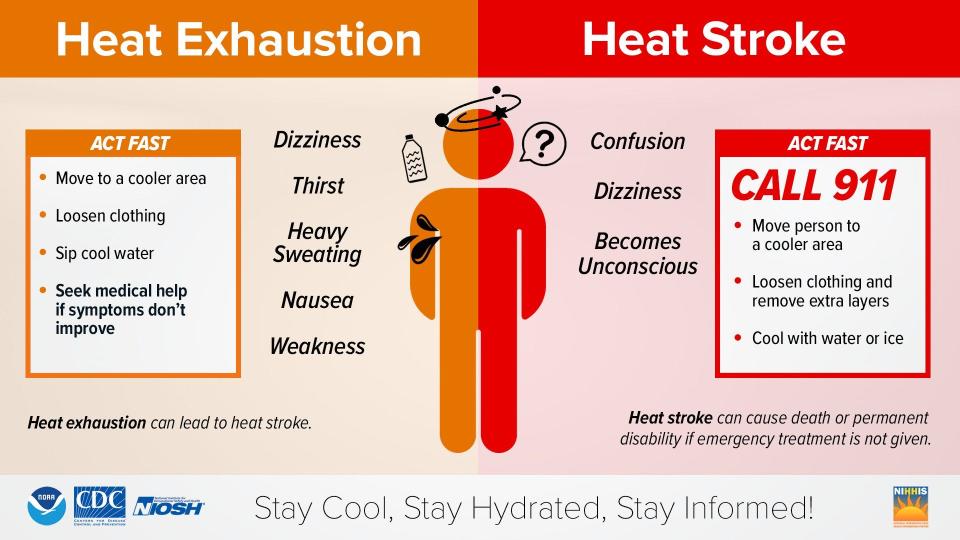Update: Another heat advisory issued for Nashville, parts of Middle Tennessee Sunday
This story is being offered for free. Please consider becoming a subscriber to help power our ongoing local coverage.
Update: Another heat advisory has been issued for parts of Middle Tennessee Sunday, which include Davidson, Williamson and Sumner counties.
Sunday’s Nashville forecast is for temperatures to reach 98 degrees with a heat index around 104, according to the National Weather Service.
The heat advisory will be in effect from 11 a.m. to 7 p.m., and includes counties mainly west of Interstate 65.
Wilson and Rutherford counties and others heading east from I-65 weren't part of Sunday's heat advisory, according to the National Weather Service's Nashville office on Saturday.
"Drink plenty of fluids, stay in an air-conditioned room, stay out of the sun, and check up on relatives and neighbors," the NWS said. "Heat stroke is an emergency! Call 911."
There is a 50% chance of rain Monday in Nashville with high temperatures still forecast to be 96 degrees.

Know the signs of heat exhaustion and heat stroke
The Tennessee Emergency Management Agency warned residents to be on the lookout for signs of heat exhaustion and heat stroke.
Heat exhaustion symptoms include:
Dizziness
Thirst
Heavy sweating
Nausea
Weakness
If you or someone you know is showing signs if heat exhaustion, act fast and move to a cooler area, loosen clothing, sip cool water and seek medical help if symptoms do not improve.
Keep in mind that heat exhaustion can also lead to heat stroke.
Heat stroke symptoms include:
Confusion
Dizziness
Loss of consciousness
If you or someone you know is showing signs of heat stroke, call 911 immediately, move to a cooler area, loosen clothing and remove extra layers and cool with water or ice until help arrives.
More information on preparing for and mitigating heat can be found at ready.gov/heat.
Tips to keep pets, children, older adults safe in the heat
OEM also provided a few tips on what to do for children, older adults and pets, who are especially vulnerable to the dire effects of heat.
Children
Never leave your child alone in a car, not even for a minute or if the car is running
Keep your car locked when you are not in it, so kids don't gain access
Create reminders by putting something in the back seat next to your child, such as a briefcase, purse, cell phone or your left shoe
If you see a child alone in a car, call 911
Set a calendar reminder on your electronic device to make sure you dropped your child off at daycare; develop a plan so you will be alerted if your child is late or a no-show
Older adults
People aged 65 years or older do not adjust as well as young people to sudden changes in temperature, according to the Centers for Disease Control and Prevention
Older adults should stay in air-conditioned buildings as much as possible. If your home doesn’t have air conditioning, contact your local health department, or locate an air-conditioned shelter in your area like city community centers, libraries and other public buildings.
Do not rely on a fan as your main cooling source when it’s extremely hot outside
Drink more water than usual and don’t wait until you’re thirsty to drink
If your doctor limits the amount of fluids you drink or has you on water pills, ask them how much you should drink during hot weather
Don’t use the stove or oven to cook — it will make you and your house hotter
Wear loose, lightweight, light-colored clothing
Take cool showers or baths to cool down
Do not engage in very strenuous activities and get plenty of rest
Check on a friend or neighbor and have someone do the same for you
Pets
You should also pay close attention to your pets during the hot and humid days ahead. According to the American Society for the Prevention of Cruelty to Animals you should know:
Pets can get dehydrated quickly, so give them plenty of fresh, clean water when it’s hot or humid outdoors
Make sure your pets have a shady place to get out of the sun, be careful not to over-exercise them and keep them indoors when it’s extremely hot
Know the symptoms of overheating in pets, which include excessive panting or difficulty breathing, increased heart and respiratory rate, drooling, mild weakness, stupor or even collapse. Symptoms can also include seizures, bloody diarrhea and vomit along with an elevated body temperature of over 104 degrees.
Animals with flat faces, like pugs and Persian cats, are more susceptible to heat stroke since they cannot pant as effectively. These pets, along with the elderly, the overweight, and those with heart or lung diseases, should be kept cool in air-conditioned rooms as much as possible.
Never leave your animals alone in a parked vehicle
When the temperature is very high, don’t let your dog linger on hot asphalt. Being so close to the ground, your pooch’s body can heat up quickly, and sensitive paw pads can burn. Keep walks during these times to a minimum.
This article originally appeared on Nashville Tennessean: Heat indexes up to 108 possible across Middle Tennessee Saturday

